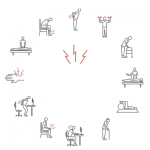(Reuters Health)—Seniors who receive prescriptions for opioid drugs to control pain after major surgery don’t usually end up addicted to them, research from Canada shows.
One year after having major surgery, less than 1% of patients over age 66 were still taking opioids, according to a report in JAMA Surgery.
Recent research has suggested the number of people who remain on opioids well after surgery was high, says study author Dr. Hance Clarke, of Toronto Western Hospital.
In a previous study, Clarke and his colleagues found only 3% of people who weren’t taking opioids before surgery were still taking them three months later. The new study followed patients for a longer period.
Surgeons, Clarke says, want to know: If they put their patients on opioids following surgery, “is it safe and what are the outcomes?”
The researchers used administrative healthcare data from 2003–2010 on 39,140 people age 66 and older who were not taking opioids preoperatively.
Slightly more than half—53%—received at least one opioid prescription within 90 days after being released from the hospital.
One year later, only 168 of the 37,659 surviving patients (0.4%) were still using opioids.
Those who had part of their lungs removed were the most likely to continue using opioids, which makes sense, says Clarke.
“You’re opening someone’s thoracic cage and crushing nerves,” he says.
The researchers note that other studies too have found less than 1% of patients remain on opioids a year after their surgeries.
Still, they say, the large number of surgeries performed each year means the number of people using opioids a year later is high.
Clarke says continued opioid use may be more likely among young people, who may not have experienced severe pain in the past.
The researchers say interventions to prevent long-term postoperative opioid use are best focused on those at the highest risk, and more research is needed to help identify those groups.


